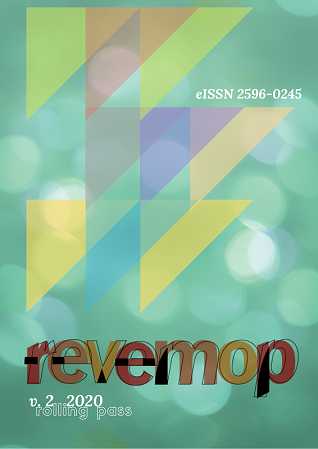A tomada da Matemática Euro/Ocidental como reapropriação/reparo
Resumo
Reorientando a Etnomatemática, longe de recuperar ou celebrar epistemologias perdidas pela colonização, propomos a necessidade de posicionar os conhecimentos locais como as autoridades que reorientam as tradições matemáticas ocidentais a serviço das culturas e das preocupações locais. Com base em vários romances pós-coloniais, nos quais um mundo dividido e um conflito de tradições estão no centro do personagem, da trama, da política e da condição humana (O Xará escrito Jhumpa Lahiri, O Norte do Amanhecer escrito por Nuruddin Farah) e, aplicando a obra de Ligia (Lichio) Lopez, na construção da indigeneidade como uma forma de colonialidade, instigamos a utilização de uma metáfora para entender e interpretar a educação matemática por meio do prisma da Etnomatemática. Alguém pode usufruir os privilégios da civilização ocidental e ainda assim perceber a resistência nesse processo de aculturação como uma ação positiva de afirmação? Quais são os custos correspondentes para qualquer escolha? E os alunos — principalmente fora do sistema convencional — na escola que, muitas vezes, enfrentam um dilema semelhante?
Downloads
Referências
ACHEBE, Chinua. Things fall apart. New York: Heinemann, 1958.
AHMED, Sara. Orientations: toward a queer phenomenology. GLQ: A journal of Lesbian and Gay Studies, v. 12, n. 4, p. 543-574, oct. 2006.
BENSON, Alan. Culturally Responsive Pedagogy: working towards decolonization, indigeneity and interculturalism (Review). London Review of Education, v. 17, n, 2, p. 236-238, jul. 2019.
BISHOP, Alan. Mathematical Enculturation: a cultural perspective on Mathematics Education. Dordrecht: D. Reidel Publishing Company, 1988.
CARDOSO, Dulce Maria. The Return. Translated by Ángel Gurría-Quintana. London : Quercus Books, 2016.
CÉSAIRE, Aimé. Discourse on Colonialism. Translated by Joan Pinkham. New York and London: Monthly Review Press, 1972.
FANON, Franz. Black skin, white masks. New York: Grove Press, 1967.
FANON, Franz. Wretched of the Earth. New York: Grove Press, 1961.
FARAH, Nuruddin. North of Dawn: a novel. London: Penguin, 2018.
GERDES, Paulus. Ethnomathematics as a new research field, illustrated by studies of mathematical ideas in African history. In: KJELDSEN, Tinne Hoff; PEDERSEN, Stig Andur; SONNE-HANSEN, Lise Mariane. (Ed.). New trends in the History and Philosophy of Mathematics. Odence: University Press of Southern Denmark, 2004, p. 135-161.
GERDES, Paulus. Reflections on ethnomathematics. For the Learning of Mathematics, v, 14, n, 2: p. 19-22, jun. 1994.
GHAZI, Syed A. V.S. Naipaul, postcolonial orientalism and Islam. Toledo: University of Toledo, 1998.
HACKING, Ian. Kinds of people: moving targets. London: The British Academy, 2006.
KHAN, Steven K. Ethnomathematics as mythopoetic curriculum. For the Learning of Mathematics, v. 31, n. 3, p. 14-18, nov. 2011.
KYRIAKOPOULOS, Giorgos, Exploiting the six mathematical activities for responding to a real community’s problem with young Roma children. INTERNATIONAL COMMISSION FOR THE STUDY AND IMPROVEMENT OF MATHEMATICS EDUCATION, 2019, Braga. Proceedings CIEAEM 71: Connections and understanding in mathematics education: Making sense of a complex world. Braga: Universidade do Minho, 2019.
LAHIRI, Jhumpa. The namesake: a novel. Boston: Houghton-Mifflin, 2004.
LÓPEZ, Ligia López. Refusing making. Journal of Curriculum and Pedagogy, v. 16, n. 2, p. 161-174, 2019.
LÓPEZ, Ligia López. The making of indigeneity, curriculum history, and the limits of diversity. New York: Routledge, 2017.
LORDE, Audre. Sister outsider: essays and speeches. New York: Crossing Press, 1984.
QUIJANO, Aníbal. Coloniality of power and Eurocentrism in Latin America. International Sociolog, v. 15, n, 2, p. 215-232, 2000.
SANTOS, Boaventura de Sousa. Between Prospero and Caliban: colonialism, postcolonialism, and inter-identity. Luso-Brazilian Review, v. 39, n. 2, p. 9-43, 2002.
SANTOS, Boaventura de Sousa. Beyond abyssal thinking: from global lines to ecologies of knowledges. Review, v. 30, n. 1, p. 45-89, 2007.
STATHOPOULOU, Charoula. Ethnomathematics: exploring the cultural dimension of Mathematics and of Mathematics Education. Athens: Atrapos, 2005.
STATHOPOULOU, Charoula. Once Upon a Time... The Gypsy Boy Turned 15 While Still in the First Grade. In: ROSA, Milton; SHIRLEY, Lawrence; GAVARRETE, Maria Elena; ALANGUI, Wilfredo V. (Ed.), Ethnomathematics and its diverse approaches for Mathematics Education. Cham, Switzerland: Springer, 2017, p. 97-123.
TALLBEAR, Kim. Widening the lens on a more inclusive science. Science Friday, v. 9, n. 6, 2019b. NPR (National Public Radio).
TALLBEAR, Kim. Caretaking relations, not American dreaming. Kalfou: a Journal of Comparative and Relational Ethnic Studies, v. 16, n. 1, p. 24-41, 2019a.
TUCK, Eve; YANG, Wayne. R-words: Refusing research. In: PARIS, Django; WINN, Maisha T. (Ed.). Humanizing research: decolonizing qualitative inquiry with youth and communities. Washington: SAGE Publications, 2014, p. 223-248.






























